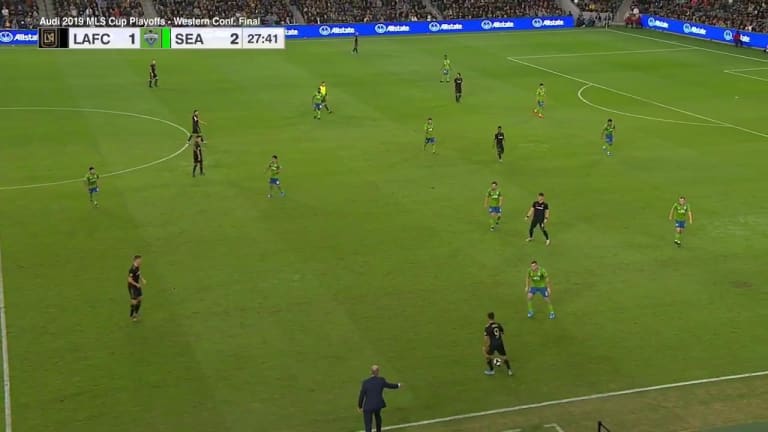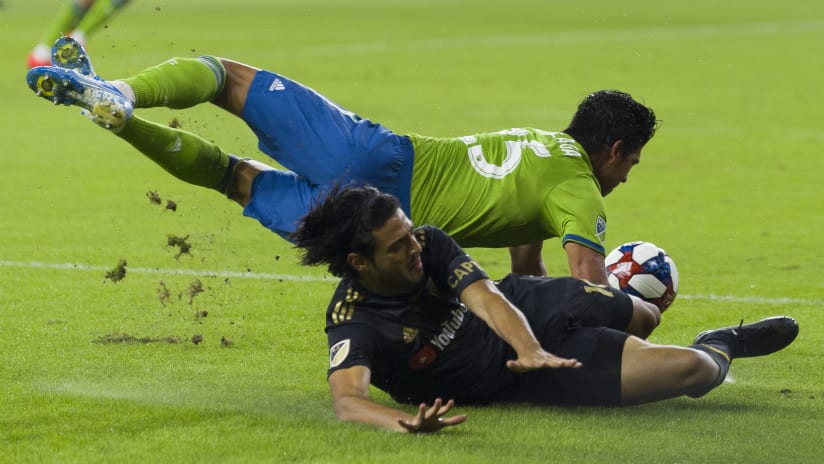The question had to be asked. You didn't need a room full of journalists to craft this narrative.
Following a season for the record books - most points in a season, best goal differential, Supporters' Shield, tied for the most goals all-time, etc. - and after finally overcoming its bitter rival to advance to within one match of the MLS Cup, LAFC fell short. A 3-1 loss to the Seattle Sounders put an end to the historic season. Another home playoff loss.
As you might expect, there was a room full of journalists on hand after the match. The question was on the lips of nearly every single one:
"Can LAFC still consider itself the greatest team of all-time in MLS despite the loss?"
Bob Bradley wasn't going to bite. He's been around the game too long to be drawn into a debate on legacy just moments after the final whistle and with his side just two years into its project.
Mark-Anthony Kaye initially seemed hesitant.
The LAFC midfielder defiantly replied that he and his teammates didn't really care what's said about them. Then without pause, and in a level tone that belied his age and years in this league, the midfielder responded to the question everyone wanted answered.
"There's going to be an MLS Cup winner and it's not going to be us," Kaye said after the defeat. "So, that's that."
Disappointment? Yes. A missed opportunity? Absolutely. But bowing out in a knockout competition consisting of four matches at the most won't ever take away from the accomplishments of a 34-match season.
And that's that.
Here are the takeaways from LAFC's 3-1 loss in the Western Conference Final:
Setting The Tone Early
Game plans aren't always Xs and Os. Seattle had another dimension they wanted to bring to this match.
From the opening whistle, the Sounders wanted to be sure LAFC felt their presence. I mean, really felt it.
You go past me, I'm gonna grab you. Cut inside, I'm gonna give you a little kick. There's a 50-50 ball, here's a little extra. Seattle wasn't afraid to put their bodies on the line in all ways necessary. And for the most part, referee Jair Marrufo (more on him later) was willing to let the two teams and not his whistle decide things.
Dogged Defense
The Sounders concentrated their efforts on the center of the pitch.
In a 4-4-2 structure without the ball, wingers Jordan Morris and Joevin Jones dropped deep to help the fullbacks double up LAFC in wide areas. Cristan Roldan and Gustav Svensson formed a band of two in front of the Seattle defense and were disciplined in staying both tight to the backline and connected to one another.

The result was plenty of bodies through the midfield when LAFC had the ball. Seattle was content sitting deep and allowing LAFC to play the ball into wide areas. Notice how central Jones is for Seattle as the opposite side winger in the picture above.
Seattle was perfectly happy to bisect the field into halves in order to protect the middle of the pitch. LAFC obliged them by moving the ball without any real pace for pretty much the entire first half of the contest. In the second half, the Black & Gold gained a bit of rhythm with the rotation of its three-man midfield. But by the time they got going, it was too little, too late and Seattle's third goal put the final nail in the coffin.
Seattle had other - shall we say, more legal - ways of showcasing their physicality as well.
Not all teams can sit deep and control matches without the ball. Especially, against a side that forces the issue like LAFC.
The Sounders were relentless in their pursuit of the ball. Even when LAFC players gained a slight edge via dribbling or a pass, there was always a Sounders player within reach.
Part of Seattle's gameplan in getting bodies in central areas was to then funnel LAFC into those areas. As LAFC found space wide, Seattle defenders would stop any vertical routes forward and force LAFC to move laterally. Even if they gained a step, LAFC players always had another defender on the way and the first man in hot pursuit.
You can see Seattle's disciplined structure both in chasing the man on the ball and in the way they stayed in position until the could get close enough to harass the ball carrier.
Where LAFC really struggled was in finding the right runs to assist the player coming inside and when to release the ball. Too often a player waited for a second too long, allowing the second man to come in and break up the play, or players running off the ball weren't able to find the spaces as Seattle adjusted to the dribble. The lack of sharpness in decision making was a two-fold problem: LAFC never found a rhythm and it opened them to transition moments.
Mentality After Goals
This sequence that has haunted LAFC in the backend of the season. What's most frustrating is that it usually starts with an LAFC goal.
Once again, LAFC scored and then conceded less than 10 minutes later. And this was another instance of goals in bunches, as Seattle then went up 2-1 less than five minutes after leveling the match.
I've got a pretty good idea as to why opponents seem to find goals in quick succession. This team doesn't want to waste any time erasing an opponent's lead, even if it's to LAFC's detriment. Too often, the Black & Gold have watched an opponent go ahead and almost recklessly gone forward as if they can get two more back at once. With the way Seattle was playing and the lethal finishers Raul Ruidíaz and Nico Lodeiro are on the counter, that's a recipe for disaster.
As for why LAFC concedes so often after scoring, your guess is as good as mine. I'm sure it has to do with maturing into controlling matches and maybe it's in the same vein as my first theory - once LAFC gets one, they want to make it two, three, and four all at once. Either way, they've got to find that edge where they can put pressure on opponents not only on the scoreboard but in how they manage after scoring.
The best teams are able to tilt the field in those moments. LAFC has done the same at times but hasn't shown it often enough in these last few months.
What's A Foul?
I asked myself this too many times in this match.
To their credit, no one from LAFC wanted to talk about referees after the match. Bob Bradley, Carlos Vela, Lee Nguyen, and Mark-Anthony Kaye all put the onus on themselves and the opposition when speaking about who decided this match.
And I'm not saying Jair Marrufo decided the match either. I'm not sure he made up his mind on much of anything in this one actually. Consistency was sorely lacking.
There's a difference between letting them play and just making it up as you go. I can tell you for sure, that players, coaches, and fans prefer the former over the latter.
There are two fouls on this play:
The first foul isn't called, the second gets the whistle. It went that way over the course of much of the night. What's worse, the sequence immediately following this free kick leads to Seattle's third goal. An otherwise innocuous decision has a real bearing on the match. That's beyond unfortunate and if you're trying to referee in a way not to have a major influence on the match, guess what...
And as far as VAR is concerned, that's something I don't have enough patience for after this match.
The lack of uniformity in officiating has to be a top priority for MLS going forward. There's little consistency match to match. Teams aren't sure what's a cautionable offense one match or simply a part of play in another. It's less than ideal that it occurred in a knockout match but you could just as easily pick out any number of times this has been the case during the 34-game season as well.













